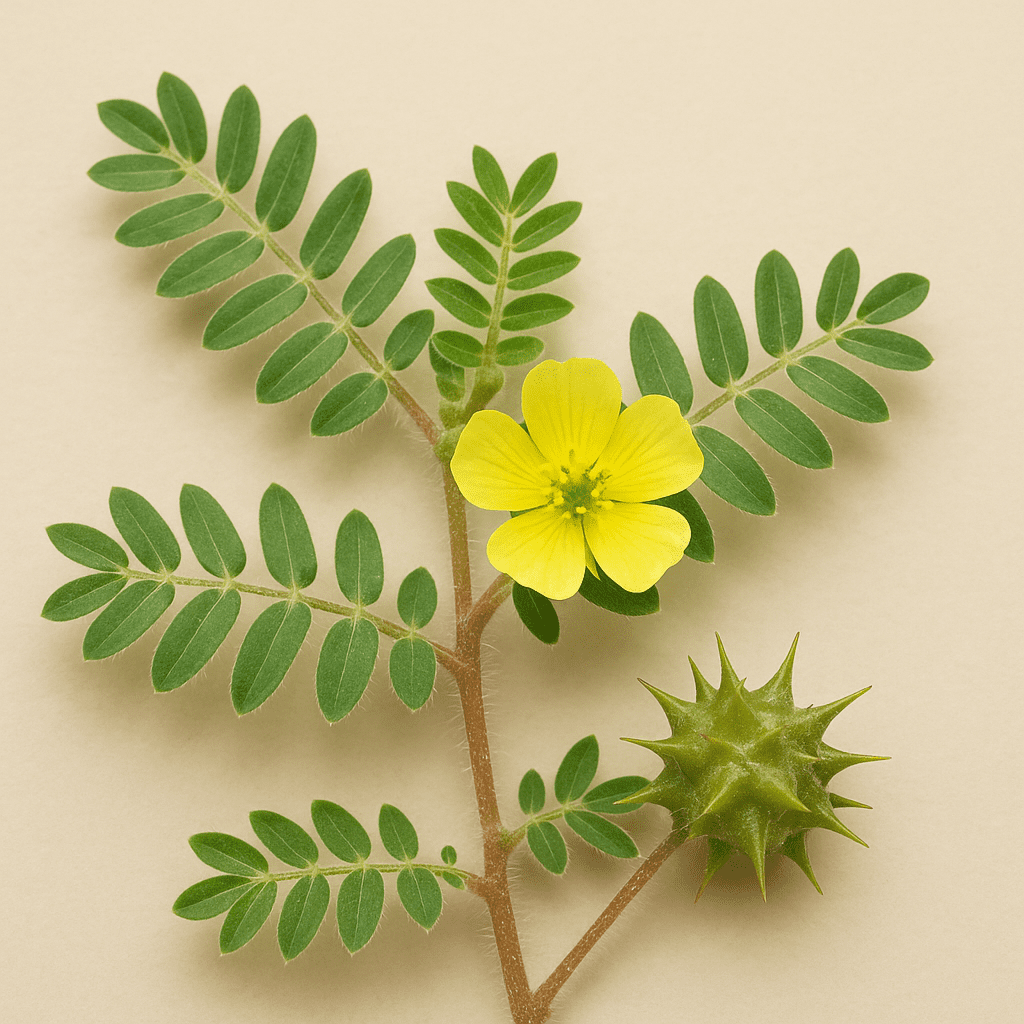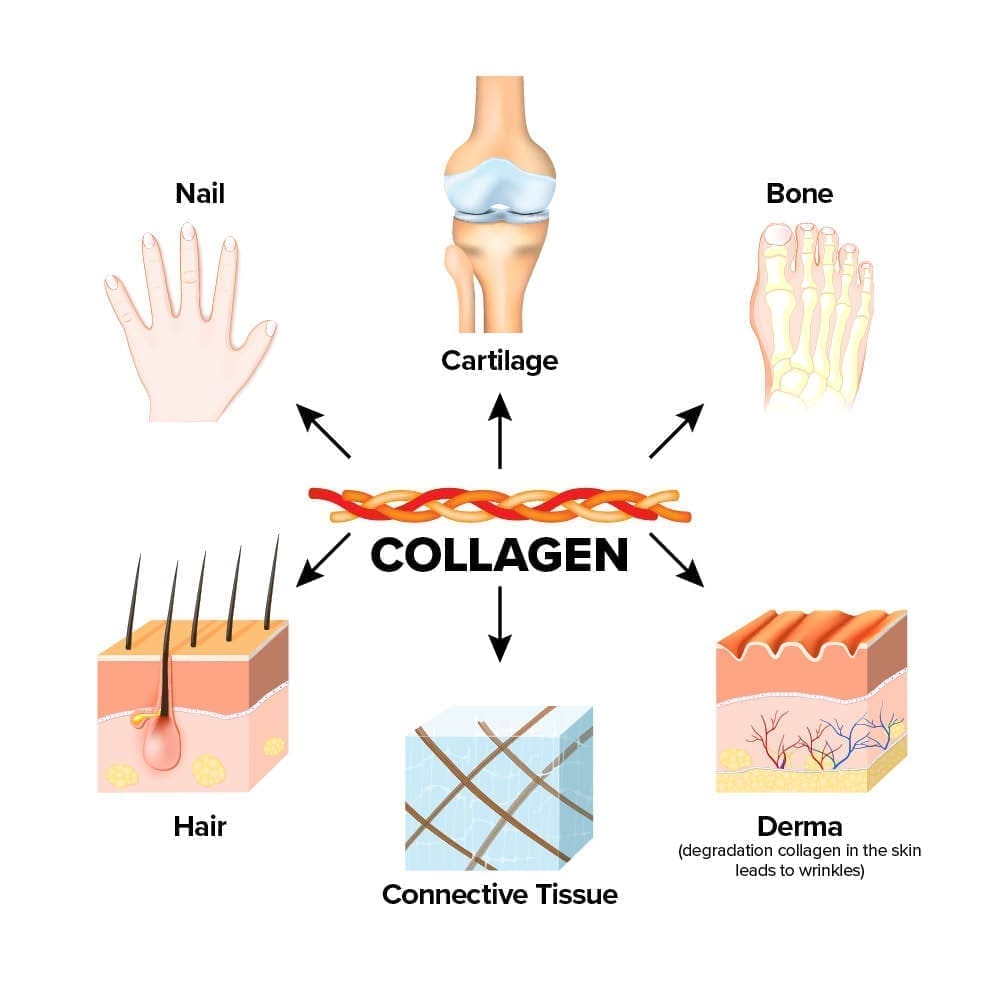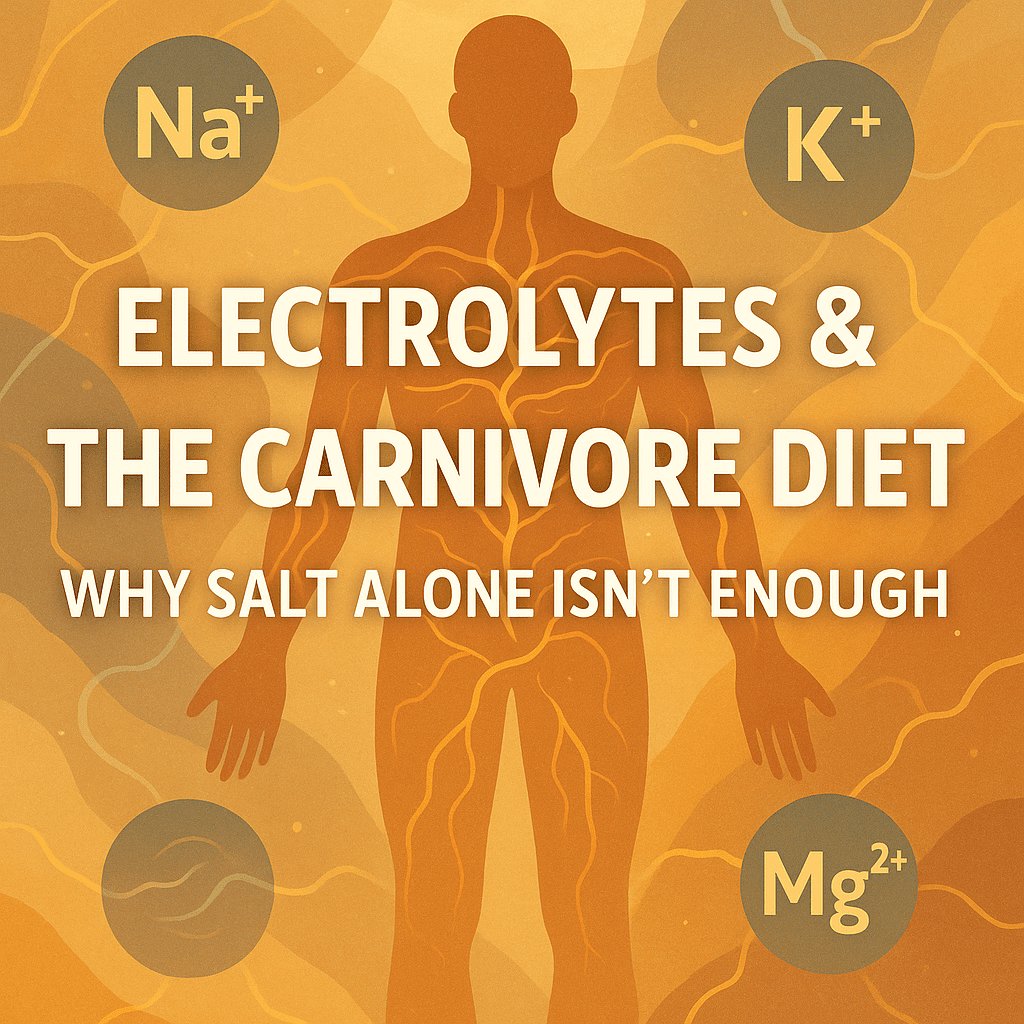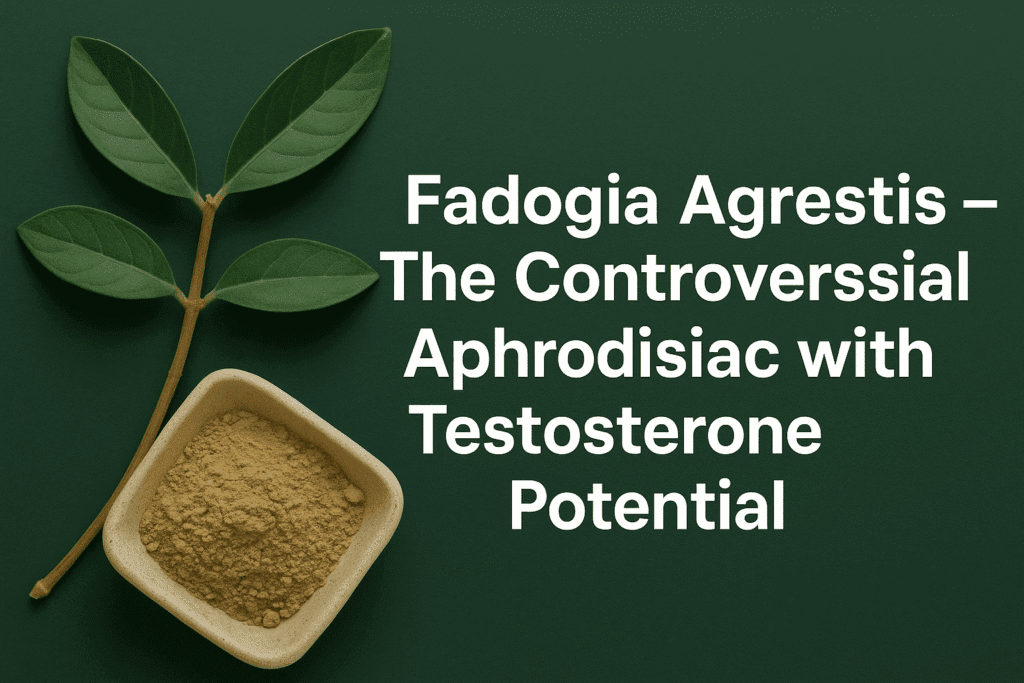The Classic Libido Booster and Herbal “Pump” Supplement
Introduction
Tribulus terrestris, commonly known as puncture vine (famous for its spiky fruits that can puncture bicycle tires), is a well-known herb in the world of male enhancement and sports supplements. It has been used in traditional medicine systems from Europe to Asia for ailments ranging from sexual dysfunction to urinary issues. In the 1970s and 80s, Eastern European athletes reportedly used tribulus as a secret weapon for strength and performance, which spurred global interest. These days, tribulus is a common ingredient in over-the-counter “T-booster” blends and libido formulas.

It’s particularly prized not necessarily for dramatically raising testosterone in young healthy men (research on that is mixed), but for its reliable ability to increase libido, improve erectile function, and possibly enhance mood and vitality. Women have also used tribulus for sexual health and menopausal symptoms with some success. Tribulus’s key active components are steroidal saponins, especially one called protodioscin, which is believed to drive many of its effects. Let’s explore how tribulus works, what benefits science has found (and what it hasn’t), its safety profile, synergies with other supplements, and some interesting anecdotes surrounding its use – including why it’s sometimes called nature’s Viagra.
Table of Contents
- Mechanisms of Action
- Evidence-Based Benefits
- Side Effects and Risks
- Synergies and Interactions
- Anecdotal and Lesser-Discussed Effects
- FAQ
- Where to Buy
- Related Studies / Further Reading
Mechanisms of Action
Tribulus terrestris operates through several mechanisms, though some of them are still being unraveled:
Increased Libido via Androgen Receptors and Neurotransmitters
Tribulus doesn’t significantly raise testosterone in young men according to many studies, but it appears to upregulate androgen receptors in the brain, making the body more responsive to whatever testosterone is present. In other words, it can amplify the effects of hormones on sexual drive without necessarily boosting the hormone levels themselves. Additionally, protodioscin from tribulus is thought to convert in the body to DHEA, a precursor hormone that can have mild androgenic and aphrodisiac effects. DHEA antagonizes GABA in the brain, which might remove some “brakes” on sexual desire. This could explain why tribulus often increases sex drive even if testosterone changes are minimal.

Nitric Oxide & Vasodilation (Erectile Function)
One well-established mechanism is tribulus’s ability to enhance nitric oxide (NO) production. NO is a vasodilator, meaning it relaxes blood vessels and improves blood flow. For erectile function, this is key – more blood flow in the penile arteries means better erections. In fact, tribulus has been shown to improve endothelial function in sexual tissue. A study on men with mild/moderate erectile dysfunction found tribulus supplementation improved their IIEF-5 scores (a measure of erectile health), attributed in part to improved NO-mediated vasodilation.
Hormonal Modulation
While tribulus’s effect on testosterone is inconsistent (often negligible in eugonadal men), it has more impact in certain cases: studies in men with fertility issues or older men sometimes show small increases in testosterone or LH after tribulus use. Additionally, tribulus may slightly lower sex hormone-binding globulin (SHBG), which can result in a modest increase in free testosterone (the active form). In women, tribulus might balance hormones by acting as a very mild androgenic influence – interestingly, it’s been seen to reduce menopausal symptoms, possibly by compensating for low estrogen with a slight androgen boost.
Sperm and Fertility
Tribulus seems to have a protective and enhancing effect on sperm quality. Animal studies show increased sperm count and motility with tribulus, and some human studies in men with infertility have reported improvements in sperm concentration and motility after tribulus supplementation. The mechanism here might be tribulus’s content of antioxidants and its slight hormone modulation (DHEA/protodioscin could support the sperm production process). There might also be a direct stimulation of the seminiferous tubules or epididymis given tribulus’s presence of saponins that can mimic some hormones.
Mood and Stress
Tribulus saponins may exert adaptogenic or mood-elevating effects. Protodioscin has been linked to releasing serotonin and dopamine in the brain, which could explain why some users feel a mood boost or reduced anxiety. In traditional Chinese medicine, tribulus (called Bai Ji Li) was used for calming the liver and treating dizziness – hinting at some neuromodulatory action. Modern research suggests tribulus might slightly reduce cortisol (observed in some animal stress models), which could indirectly aid in hormone balance and mood.
In essence, tribulus terrestris works as a libido and performance enhancer primarily by making the body’s existing hormones work better (increasing receptor sensitivity and blood flow) rather than drastically changing hormone levels in all cases. It targets sexual function from multiple angles: brain, blood vessels, and gonads, which is why it’s enjoyed enduring popularity as a “complete” male herb.
Evidence-Based Benefits
Tribulus has been the subject of a mix of scientific findings – some very supportive, others showing little effect (often depending on the population studied). Let’s break down what evidence we have:
Libido and Sexual Desire
The most consistent benefit of tribulus seen in studies is an increase in sexual desire. Clinical trials in men with reduced libido or erectile issues have shown improvements with tribulus supplementation. For example, a 2017 systematic review reported that in several studies tribulus significantly improved sexual desire and arousal in men.
Erectile Function
Several studies indicate that tribulus can help with mild to moderate erectile dysfunction (ED). A notable double-blind study in 2018 (in Bulgaria) on men aged 18–65 with ED and/or low libido showed that taking a high-dose tribulus extract (1500 mg/day) for 12 weeks significantly improved IIEF scores (covering erection firmness, orgasmic function, and satisfaction) compared to placebo.
Testosterone and Strength (Context-Dependent)
The effect of tribulus on testosterone is where evidence is mixed. In healthy young men, multiple studies found no significant rise in testosterone or strength performance from tribulus supplementation. However, in men with fertility issues or older men with somewhat low T, tribulus has shown modest increases.
Female Sexual Health and Menopause
Tribulus is one of the few “testosterone” herbs that has quite positive research in women too. A systematic review in 2020 concluded that tribulus significantly improved sexual function scores in women with low libido or arousal difficulties. Women also did not experience significant side effects or virilization from these moderate doses.
Athletic Performance and Body Composition
As alluded to above, tribulus is not strongly supported for improving athletic performance in already well-trained individuals. Studies in strength athletes found no benefit on muscle mass or strength from tribulus. However, in untrained individuals, tribulus might indirectly improve exercise capacity a bit due to improved motivation and blood flow.
Side Effects and Risks
Tribulus terrestris has been used in herbal medicine for a long time and is generally regarded as safe for most people, but it’s not without any side effects or cautions:
Gastrointestinal Issues
The most common side effects reported with tribulus are minor stomach upset, cramping, or diarrhea. Saponins can be a bit irritating to the GI tract in some individuals. Taking tribulus after a meal usually helps reduce these issues, or dividing the dose throughout the day. Some users also experience reflux or a bad aftertaste (the herb itself is bitter).
Potential Toxicity in Rare Cases
There have been a few isolated case reports linking tribulus to serious adverse effects, but these are very rare and often involved unusually high intakes or unique circumstances. Most supplements use fruit or root extract, which might differ in profile. Nonetheless, if you have liver or kidney disease, or if you notice dark urine, jaundice, or severe fatigue while taking tribulus, discontinue and consult a doctor.
Hormone-Related Effects
Tribulus is far milder in hormone impact than something like fadogia, but any substance that tweaks hormones could have minor related effects. In men, if tribulus does raise T slightly, one might see an uptick in DHT or estrogen via conversion. However, tribulus’s effects aren’t usually strong enough to cause things like gynecomastia or hair loss by itself.
Allergic Reactions
True allergy to tribulus is rare, but possible. Signs would be rash, itching, swelling, or trouble breathing after ingestion – if that happens, treat it like any allergic reaction (stop use, possibly take antihistamines, and seek medical help if severe).
Drug Interactions
Tribulus might interact with certain medications. Because it can lower blood sugar a bit and blood pressure modestly (in some individuals), if someone is on diabetes meds or antihypertensives, tribulus could augment those effects, leading to hypoglycemia or hypotension if not monitored. It’s wise to check with a healthcare provider if you’re on such medications.
Synergies and Interactions
Tribulus terrestris is often combined with other supplements to enhance its effects. It tends to play nicely with others, as it’s relatively mild and has complementary actions:
Tribulus + Maca
A very popular duo for all-around sexual health is tribulus and maca root. Together, they cover a wide spectrum: tribulus improving nitric oxide and some androgenic signaling, maca improving semen quality, libido, and perhaps mood.
Tribulus + Tongkat Ali/Ashwagandha
In testosterone booster products, it’s common to see tribulus included with tongkat ali and/or ashwagandha. These three together target stress, hormone, and sexual function from all angles.
Tribulus + L-Citrulline or Pre-Workout
Athletes sometimes add tribulus to their pre-workout supplements hoping for extra pump or strength. Tribulus’s nitric oxide support can complement other pump ingredients like citrulline or beetroot.
Tribulus + Fadogia Agrestis
Some might consider pairing tribulus with fadogia for a one-two punch: fadogia to strongly raise testosterone, tribulus to amplify libido and blood flow.
Tribulus is widely available at Amazon, if you order through this link we earn a small commission to help support the site, at no additional cost to you.
Anecdotal and Lesser-Discussed Effects
Tribulus terrestris has plenty of anecdotal lore. Let’s dive into some interesting or lesser-known tidbits from user experiences and traditional uses:
- Mood and Confidence Boost
- Pump and Vascularity
- Sleep Dreams
- Fertility Success Stories
- Anger and Aggression?
- Herbal Synergy Anecdotes
- Absence of Effect in Some Young Men
- Cultural Anecdote
FAQ
Where to Buy
Tribulus is widely available at Amazon, if you order through this site we earn a small commission, at no additional cost to you.
🇬🇧 UK Visitors – Click here to buy Tribulus
🇺🇸 US Visitors – Buy tribulus Here
Related Studies / Further Reading
- PMC – Increased Libido via Androgen Receptors and Neurotransmitters
- PMC – Nitric Oxide & Vasodilation
- Liebertpub – Sperm and Fertility
- MSKCC – Side Effects and Risks
- Cleveland Clinic – Drug Interactions





